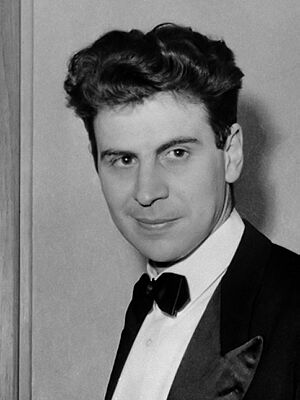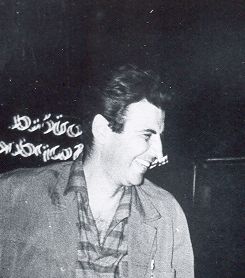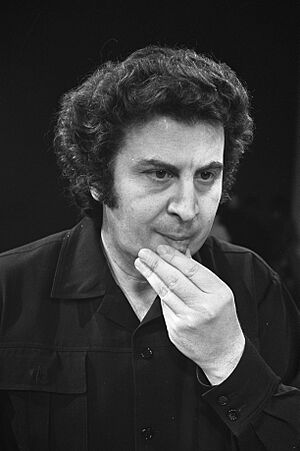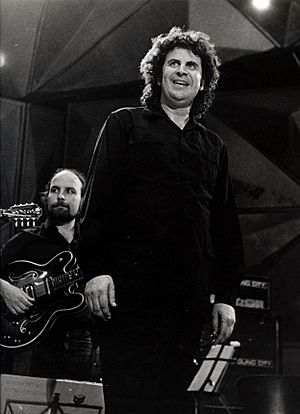Mikis Theodorakis facts for kids
Quick facts for kids
Mikis Theodorakis
|
|
|---|---|
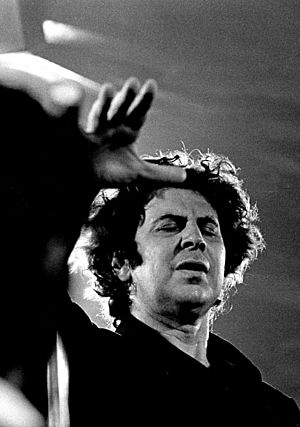
Theodorakis conducting the orchestra in concert at Cultural Center "Fabrik" in Hamburg, 1971
|
|
| Born |
Michail Theodorakis
29 July 1925 Chios, Second Hellenic Republic
|
| Died | 2 September 2021 (aged 96) Athens, Greece
|
| Occupation |
|
| Political party | Communist Party of Greece |
| Spouse(s) |
Myrto Altinoglou
(m. 1953) |
| Children | 2 |
| Musical career | |
| Genres | 20th-century classical music |
| Years active | 1943–2021 |
| Labels |
|
| Member of the Hellenic Parliament | |
| In office 1964–1967 |
|
| In office 1981–1986 |
|
| In office 1989–1993 |
|
| Minister of State | |
| In office 11 April 1990 – 1 April 1993 |
|
| Prime Minister | Konstantinos Mitsotakis |
Michail "Mikis" Theodorakis (Greek: Μιχαήλ "Μίκης" Θεοδωράκης; 29 July 1925 – 2 September 2021) was a famous Greek composer and songwriter. He created over 1,000 musical pieces during his life.
He wrote music for well-known films like Zorba the Greek (1964), Z (1969), and Serpico (1973). One of his most famous works is the "Mauthausen Trilogy". Many people consider it the most beautiful music ever written about the Holocaust. Until he passed away, he was known as Greece's most famous living composer. He also received the Lenin Peace Prize for his work.
Theodorakis was involved in politics, often supporting left-wing ideas. He was a member of the Greek Parliament for the Communist Party of Greece (KKE) from 1981 to 1990. He also worked with other political groups to help Greece during difficult times. In 1990, he became a government minister. He worked to fight against drugs and terrorism. He also promoted culture and education. Theodorakis was a strong voice against the military government in Greece from 1967 to 1974. They even put him in prison and banned his songs.
Contents
Early Life and Musical Beginnings
Mikis Theodorakis was born on the Greek island of Chios. He grew up in different cities across Greece. His father was a lawyer, and his mother came from a Greek family in Turkey. Mikis loved Greek folk music and church music from a young age. He dreamed of becoming a composer.
He started writing his own songs without any instruments. He took his first music lessons in Patras and Pyrgos. At seventeen, he gave his first concert in Tripoli. In 1943, he moved to Athens. He joined a group fighting for freedom during a difficult time in Greece. He was arrested and sent away to islands like Icaria and Makronisos.
When he was not in hiding or prison, he studied music at the Athens Conservatoire until 1950. He finished his studies with excellent results. After that, he went to Crete. There, he became the head of the Chania Music School. He also started his first orchestra.
Studying Music in Paris
In 1953, Theodorakis married Myrto Altinoglou. The next year, they moved to Paris, France. He studied at the Conservatory there. He learned about music analysis from Olivier Messiaen. He also learned how to conduct an orchestra from Eugene Bigot.
His music for orchestras and ballets became very popular around the world. These included a Piano concerto and his first symphony. His ballet music, like Greek Carnival, also received praise. In 1957, he won a Gold Medal at the Moscow Music Festival. In 1959, he won the American Copley Music Prize. This award recognized him as the "Best European Composer of the Year". His music for films like Ill Met by Moonlight and Honeymoon was also very successful. The song "The Honeymoon Song" even became popular with The Beatles.
Returning to Greek Music
In 1960, Theodorakis came back to Greece. He wanted to connect with Greek music again. His song cycle Epitaphios helped start a new cultural movement in Greece. Many of his important works were based on Greek and world poetry. He wanted to bring back the respect he felt Greek music had lost. He created a new style called "metasymphonic music". This style mixed orchestra music with popular songs and Greek instruments.
He started the Athens Little Symphony Orchestra. He gave many concerts to help people learn about orchestra music.
In 1963, after a politician named Gregoris Lambrakis was killed, Theodorakis started the Lambrakis Democratic Youth group. He became its leader. This group grew very quickly and had over 50,000 members. It helped create a big cultural movement in Greece. In 1964, Theodorakis became a member of the Greek Parliament. Because of his political views, many of his songs were not allowed on the radio.
Also in 1964, he wrote the famous music for the film Zorba the Greek. The main theme, known as "Syrtaki dance", became a symbol of Greece. It was inspired by old Cretan dances.
Life During the Dictatorship
On 21 April 1967, a military government took control of Greece. Theodorakis became a symbol of fighting against this government. He went into hiding and called for people to resist the dictatorship. The new government banned his music. On 21 August, he was arrested and put in jail for five months. After his release, he was sent away with his family to places like Zatouna and a prison camp called Oropos.
Many famous people around the world, like Dmitri Shostakovich and Leonard Bernstein, asked for Theodorakis to be freed. In 1970, he was allowed to go to Paris, France. He was very sick with tuberculosis and had to go to the hospital. His wife and children joined him later.
While in exile, he continued to compose music. In 1977, he even created the anthem for the French Socialist Party.
Fighting for Freedom from Abroad
In 1971, Mikis Theodorakis was invited to Chile by its president, Salvador Allende. There, he heard poems by Pablo Neruda and loved them. He promised to set them to music. Back in Paris in 1972, he met Neruda and worked on the music for Canto General.
Theodorakis met many important leaders and became friends with politicians like François Mitterrand. For many people, he was a symbol of fighting against the Greek dictatorship.
Returning Home to Greece
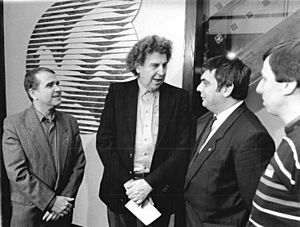
When the military government fell, Mikis Theodorakis returned to Greece on 24 July 1974. His return was a huge celebration, with large crowds and his music playing everywhere. He continued his music and concert tours. He also became involved in public life again. He was elected to the Greek Parliament several times (1981–1986 and 1989–1993). From 1990 to 1992, he was a minister in the government.
He worked to raise awareness about human rights and peace. He started the Greek–Turkish Friendship Society with Turkish artist Zülfü Livaneli.
From 1981, Theodorakis started a new period of his music. He wrote more orchestra music, including his Second, Third, Fourth, and Seventh Symphonies. He also composed his first opera, Kostas Kariotakis, and the ballet Zorba the Greek. During this time, he wrote his autobiography, The Ways of the Archangel.
From 1989, he composed three operas: Medea, Elektra, and Antigone. His last opera, Lysistrata, was a call for peace. These works marked a period he called his Lyrical Life.
In March 1997, he gave a concert in Berlin. After that, he was hospitalized and said it would be his last concert. Theodorakis received honorary degrees from many universities.
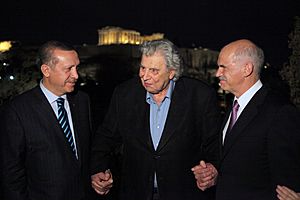
Later Life and Passing
In his later years, Mikis Theodorakis lived quietly. He spent his time reading, writing, and publishing his music. He still spoke out on important issues. In 1999, he opposed NATO's Kosovo war. In 2003, he spoke against the Iraq War. He received many awards for his music and his work for peace.
In 2009, he composed a Rhapsody for Strings. On 30 January 2013, he completed one of the largest musical works ever created by any composer.
On 26 February 2019, Theodorakis was hospitalized for heart problems. He had surgery to get a pacemaker. He passed away from heart failure at his home in Athens on 2 September 2021, at 96 years old. The Greek Prime Minister declared three days of national mourning. Thousands of people, artists, and political leaders paid their respects. According to his wishes, he was buried in his hometown of Galatas, near Chania, Crete, next to his parents and brother.
His Political Beliefs
Mikis Theodorakis was known for his strong political views.
Views on Israel and Jewish People
Theodorakis did not agree with Israel's actions in Gaza and the West Bank. He criticized the Greek Prime Minister for becoming too close with the Israeli Prime Minister. Theodorakis called himself "anti-Zionist". In 2003, he made some comments that were seen as anti-Jewish. He later apologized, saying his comments were only about the policies of the Israeli government and the US, and that he loved the Jewish people. In 2013, he spoke out against a group called Golden Dawn for denying the Holocaust.
Views on the United States
Theodorakis was a long-time critic of the United States. During the invasion of Iraq, he made strong statements against the US. He also strongly opposed the NATO bombing of Yugoslavia in 1999. He took part in a concert to protest the bombing.
"Spitha" Movement (2010–2011)
On 1 December 2010, Mikis Theodorakis started a group called "Spitha: People's Independent Movement". This group was not political in the usual sense. It encouraged people to come together and share their ideas. Its main goal was to help Greece overcome its economic problems. In May 2011, Theodorakis gave a speech in Athens to about 10,000 people. He criticized the Greek government for taking loans from the International Monetary Fund.
Views on Macedonia
In 1997, Mikis Theodorakis said that the name of Macedonia was not as important as people living in peace. He believed that good relations between the two peoples would make the name issue less important.
However, in 2018, Theodorakis was a main speaker at a large rally in Athens. He stated that "Macedonia is one, was, is and will always be Greek." This statement received support from some political parties. Some people disagreed with his new stance. His house was even vandalized by a group of anarchists before the rally.
Mikis Theodorakis's Works
His song cycles are based on poems by Greek writers and by García Lorca and Neruda. Some of these are: Epitaphios, Archipelagos, Epiphania, The Hostage, Mauthausen, and Romiossini.
Symphony Music
- 1945: The Apocalypse (Ode to Beethoven)
- 1953: First Symphony ("Proti Simfonia")
- 1981: Symphony No 2 ("The Song of the Earth")
- 1981: Symphony No 3
- 1983: Symphony No 7 ("Spring-Symphony")
- 1986–1987: Symphony No 4 ("Of Choirs")
- 1995: Rhapsody for Guitar and Orchestra
- 1996: Rhapsody for Cello and Orchestra
Chamber Music
- 1942: Sonatina for piano
- 1946: String Quartet No 1
- 1947: Trio, for violin, cello and piano
- 1955: Little Suite, for piano
Cantatas and Oratorios
- 1960: Axion Esti
- 1969: The March of the Spirit
- 1971–82: Canto General
- 1992: Canto Olympico
Hymns and Anthems
- 1977: Hymn of the French Socialist Party
- 1992: "Hellenism" (used at the 1992 Summer Olympics and 2004 Summer Olympics)
Ballets
- 1953: Carnaval
- 1959: Antigone
- 1987–88: Zorba il Greco
Operas
- 1984–1985: Kostas Karyotakis
- 1988–1990: Medea
- 1992–1993: Elektra
- 1995–1996: Antigone
- 1999–2001: Lysistrata
Music for Plays
Classical Tragedies
- 1959–1960: Phoenician Women (Euripides)
- 1966–1967: Lysistrata (Aristophanes)
- 1986–1988: Oresteia (Aeschylus)
Modern Plays
- 1960–1961: To Tragoudi tou Nekrou Adelfou (Ballad of the Dead Brother)
- 1963: I Gitonia ton Angelon (The Quarter of Angels)
- 1975: Christophorus Kolumbus (Nikos Kazantzakis)
Main Film Scores
- 1957: Ill Met by Moonlight
- 1960: Honeymoon
- 1961: Phaedra
- 1962: Electra
- 1964: Zorba the Greek
- 1969: Z
- 1973: Serpico
- 1977: Iphigenia
Awards and Honors
- Lenin Peace Prize, USSR (1983)
- Order of the Phoenix, Greece (1995)
- Officer of the Legion of Honour, France (1996)
- Doctor honoris causa of the University of Athens (1996)
- "Erich Korngold" prize, Germany (2002)
- UNESCO International Music Prize (2005)
- Honorary member of the Academy of Athens (2013)
Images for kids
See also
 In Spanish: Mikis Theodorakis para niños
In Spanish: Mikis Theodorakis para niños
 | James B. Knighten |
 | Azellia White |
 | Willa Brown |


